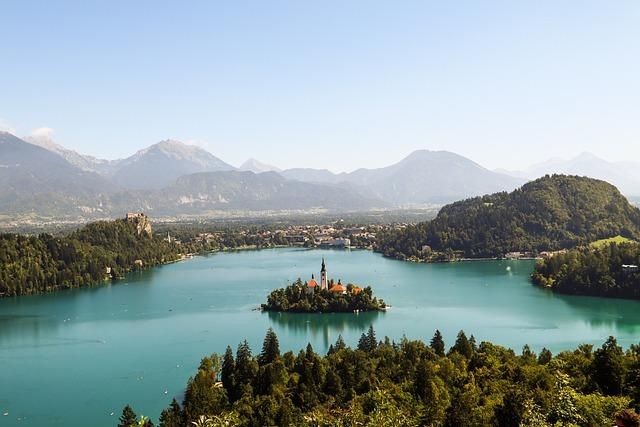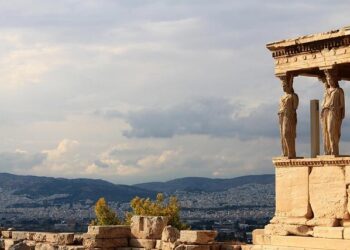In a significant diplomatic development, Slovenia has officially recognized the state of Palestine, becoming the latest member of the European Union to take this step. The move, announced by the country’s government, reflects Slovenia’s commitment to supporting Palestinian sovereignty and self-determination amidst ongoing tensions in the region.This recognition is part of a broader trend within Europe, as several EU nations have grappled with their positions on the Israeli-Palestinian conflict.With this decision,Slovenia joins a growing list of countries advocating for a two-state solution,calling for renewed dialogue and cooperation in pursuit of peace in the Middle East. This article explores the implications of Slovenia’s recognition and its potential impact on EU foreign policy and the broader geopolitical landscape.
Slovenias Diplomatic Shift: Implications for EU Foreign Policy
The recent move by Slovenia to formally recognize palestine as a state underscores a significant diplomatic pivot within the European Union. This decision may have broad implications not only for bilateral relations in the region but also for the EU’s collective foreign policy approach. By aligning itself with other countries that support Palestinian statehood, Slovenia places pressure on the EU to adopt a more unified and assertive stance regarding Israel-Palestine relations.Politically, Slovenia’s recognition reflects a growing distaste among EU members towards Israel’s policies in the occupied territories, potentially leading to a reevaluation of diplomatic ties and trade agreements with Jerusalem.
As Slovenia steps into this evolving geopolitical landscape,it’s essential to consider the implications for EU unity and decision-making. The support for Palestinian statehood can create a divergence of opinion among member states, revealing varying levels of commitment to the two-state solution. Possible outcomes include:
- Increased diplomatic tensions between EU members that support Israeli policy and those advocating for Palestinian rights.
- shifts in aid and cooperation frameworks, where the EU may deepen ties with Palestine while reassessing its relationship with Israel.
- A call for renewed peace negotiations, with Slovakia potentially taking a more prominent role as a mediator in the Israel-Palestine dialogue.
| Action | Potential Impact |
|---|---|
| Increased recognition of Palestine | Strain on Israel-EU relations |
| Policy shifts in EU institutions | Greater focus on human rights in the region |
| Enhanced diplomatic efforts | Creation of a more equitable framework for peace |

Understanding the Context: Slovenias Recognition of Palestine
Slovenia’s decision to recognize Palestine marks a significant shift in the geopolitical landscape of Europe, aligning with a growing trend among some EU nations to support Palestinian statehood. This recognition comes in the wake of ongoing tensions in the region and reflects Slovenia’s stance on promoting international law and human rights. Key factors influencing this decision include:
- Ancient Context: Slovenia’s own journey to independence has fostered a sense of solidarity with nations seeking self-determination.
- EU Dynamics: As the bloc navigates its foreign policies, Slovenia’s move could push the EU to adopt a more unified stance on the Israeli-Palestinian conflict.
- Regional Stability: Recognizing Palestine may contribute to a framework for peace and dialogue aimed at resolving the longstanding conflict.
In the broader spectrum of international relations, Slovenia’s move is indicative of a gradual shift in perspectives towards the Palestinian cause, as seen in the policies of several other countries.Notably, this recognition plays into a larger conversation about statehood that involves key players such as:
| Country | Recognition Status |
|---|---|
| Slovenia | Recognized Palestine (2023) |
| Sweden | Recognized Palestine |
| Spain | Recognized Palestine (non-binding resolution) |
| France | supports Two-State Solution |
This table illustrates the varying degrees of recognition and support from EU countries, shedding light on how Slovenia’s recognition fits into this larger narrative. As the call for Palestinian statehood continues to resonate across the globe, Slovenia’s position could influence other EU nations and potentially alter how the bloc collectively addresses the Israeli-Palestinian conflict.

Reactions from the International Community: support and Opposition
The recognition of Palestine by Slovenia has been met with a mix of enthusiasm and trepidation across the globe, highlighting the deep divisions in perspectives regarding the Israeli-Palestinian conflict. Supporters of Slovenia’s decision, including various European Union officials and humanitarian organizations, emphasize the move as a crucial step towards justice and long-term peace in the region. They argue that acknowledging Palestine’s statehood could pave the way for renewed negotiations, citing the need for international recognition as essential for the Palestinian people. Some notable reactions include:
- EU Foreign Policy Chief Josep Borrell: “Every recognition is a step towards a two-state solution.”
- Human Rights Watch: “Slovenia’s recognition embodies a commitment to international law.”
- Palestinian authority: “A momentous achievement in our quest for independence.”
Conversely, opposition to Slovenia’s recognition has been staunch, particularly among israeli officials and their allies in the united States. Critics warn that such unilateral decisions complicate diplomatic efforts and may embolden extremist elements, undermining the prospect of peace in the region. They propose that recognition without a direct agreement risks perpetuating divisions rather than fostering dialogue. Key responses from this camp include:
- Israeli Prime Minister: “This decision distances us from peace rather than bringing us closer.”
- US State Department: “We support Israel’s right to defend itself against unilateral moves.”
- Global Jewish Organizations: “This recognition undermines the legitimacy of negotiations.”

The Impact of Recognition on Palestines quest for Statehood
The recent move by Slovenia to recognize the state of Palestine marks a significant development in the ongoing pursuit of Palestinian statehood. This recognition is not merely symbolic; it reflects a growing sentiment within the European Union and the broader international community regarding Palestinian rights. Slovenia joins a list of countries that have taken similar steps, which may influence other nations to reconsider their stance. Recognition from EU states can bolster the legitimacy of Palestinian claims on the global stage, providing diplomatic weight in discussions that often see Palestine marginalized.
Furthermore, this decision underscores the potential ripple effects of recognition on global political dynamics. Countries that recognize Palestine frequently enough become part of a larger coalition advocating for Palestinian sovereignty, which can lead to heightened international dialogue on the issue.Among key impacts, we can anticipate that recognition may result in:
- Increased Political Engagement: Enhanced diplomatic discussions regarding the two-state solution.
- Strengthened International Legitimacy: Greater support for Palestine in united Nations discussions.
- Community Support: Heightened visibility for Palestinian rights at grassroots and international levels.
| Country | Status of Recognition |
|---|---|
| slovenia | Recognized |
| Sweden | Recognized |
| Spain | Pending Recognition |

Future Prospects: what This Means for Slovenia and EU relations in the Region
The recent decision by Slovenia to officially recognize the Palestinian state may herald a significant shift in the dynamics of EU foreign policy towards the Israeli-Palestinian conflict. This step underscores Slovenia’s commitment to supporting Palestinian self-determination and could encourage other EU member states to reconsider their positions.As the EU navigates its own internal differences regarding recognition and support, Slovenia’s move may serve as a catalyst for a more unified approach within the broader context of international relations. Some potential implications include:
- Increased diplomatic engagement: Slovenia’s recognition could lead to enhanced diplomatic ties with Palestine, fostering collaboration on various fronts including trade and cultural exchange.
- Pressure on other EU states: This recognition might embolden similarly inclined nations to advocate for Palestinian sovereignty, adding momentum to existing debates within EU institutions.
- Shift in EU consensus: Slovenia’s actions may challenge the prevailing hesitancy among member states,potentially leading to new initiatives aimed at conflict resolution in the region.
Moreover, this pivotal moment has regional implications that will resonate beyond just Slovenia and its immediate neighbors. As tensions in the middle East remain high, the EU’s role as a mediator could become increasingly pronounced. Slovenia’s decision also raises questions about the EU’s strategic positioning in relation to key partners in the region, including Israel, which has traditionally held a strong alliance with several EU nations. The recognition may lead to a realignment of diplomatic priorities, as nations reassess their stances based on Slovenia’s bold choice. Key considerations for EU relations might include:
| Consideration | Potential Impact |
|---|---|
| Regional Relations | Enhanced respect and cooperation with Arab states, strengthening EU’s influence in the region. |
| Internal EU Cohesion | Possible fractures or stronger coalitions depending on differing views towards Palestine among member states. |
| International Standing | EU may emerge as a proactive player on the global stage regarding human rights and conflict resolution. |
Recommendations for Policymakers: Navigating Complex Diplomatic Waters
as Slovenia joins the ranks of EU countries recognizing Palestinian statehood, it is imperative for policymakers to adopt a multifaceted approach in their diplomatic engagements. Acknowledging statehood is no longer a unilateral issue; it involves a delicate balancing act of international relations. To navigate these complex diplomatic waters, decision-makers should consider the following strategies:
- Engage in Open Dialogue: Foster interaction between conflicting parties to promote understanding and cooperation.
- Establish Regional Partnerships: Collaborate with neighboring countries to build a collective stance that supports peaceful resolutions.
- Promote Economic Initiatives: Invest in programs that enhance economic development for both Israel and Palestine, thereby incentivizing peace.
Additionally, international relations require a keen awareness of geopolitical ramifications. Policymakers must remain vigilant of the evolving landscape and potential backlash from domestic and international stakeholders.It is essential to address these concerns through a cohesive strategy that includes:
- Regular Assessment: Conduct frequent evaluations of diplomatic impacts to adjust strategies as necesary.
- Strengthening Alliances: Reaffirm commitments with allies while managing dissenting voices within the EU and beyond.
- Promoting human Rights: Keep human rights at the forefront of discussions, ensuring both sides feel acknowledged and valued.
| Key Considerations | Potential Outcomes |
|---|---|
| Dialogue Initiatives | Improved mutual understanding |
| Regional Collaboration | Strengthened peace agreements |
| Economic Incentives | Enhanced stability and growth |
Closing Remarks
Slovenia’s recent decision to officially recognize the State of Palestine marks a significant development in the ongoing dialogue surrounding Palestinian sovereignty and European foreign policy. By joining other EU member states in this recognition, Slovenia not only reaffirms its commitment to international law but also seeks to address the longstanding issues of peace and stability in the Middle East. As the recognition of Palestine continues to garner mixed reactions across the continent, Slovenia’s move underscores the complexities of diplomatic relations and the diverse perspectives within the EU regarding this contentious issue. The ramifications of this recognition will likely resonate within broader geopolitical discussions, influencing both regional dynamics and international responses in the months to come.as the situation evolves,it remains crucial to monitor how this decision impacts Slovenia’s relations with both Israel and Palestine,as well as how it shapes the EU’s collective approach to the Israeli-Palestinian conflict.
















